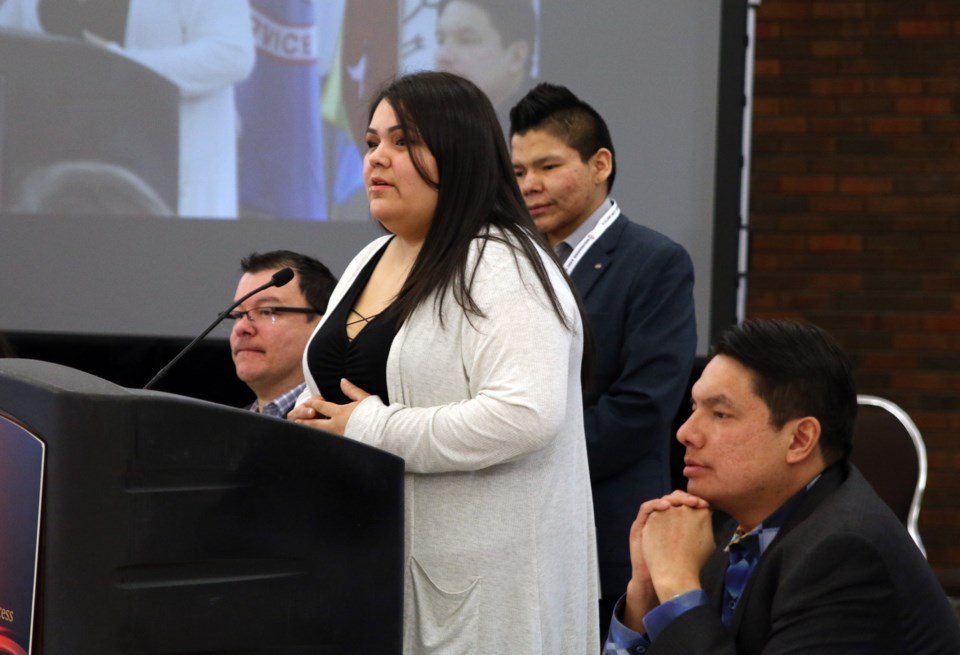THUNDER BAY - Wynona Gagnon, a member of the Nishnawbe Aski Nation Youth Council, said when she is on the river, she is learning about geography and when she is being taught about the plants on the land, she is learning about agriculture.
These are the lessons she believes are missing when it comes to the education Indigenous youth receive and it’s time to update the curriculum by allowing First Nations more say in what is taught.
“That is absolutely crucial because we need to be able to incorporate our traditional ways and cultures and ways of life because not only is our culture important, but it is an education system in itself,” Gagnon said.
Traditional teaching was one of many topics up for discussion during a special NAN Chief's Assembly on education that opened in Thunder Bay on Tuesday.
NAN Deputy Chief, Derek Fox, who handles the education portfolio, said ideas like traditional teaching or allowing students to remain in or near their home communities for school, are all related to First Nations having jurisdiction over their own education.
In December 2018, NAN and the federal government signed an education agreement-in-principle, which would allow for continued negotiations in granting First Nation communities control over education.
According to Fox, 36 of the 49 NAN communities have signed onto the agreement.
“The plan there is to negotiate with the federal government to implement taking control of our own education system,” Fox said. “The hope is that at the end of four years, our communities will be able to say how they want their education systems to be run.”
What that control would look like will depend on each individual community, Fox said, but the crucial piece is that it is the communities making the decisions.
“It might be that one of our communities want to teach our kids just the language, culture, and hunting up to Grade 3 or 4,” Fox said. “This would enable them to do that. It might be that some communities want to stick with the current system and learn math and English and have all those skills for university. It might be a mix of the two. It’s going to be up to the community.”
Having those traditional teachings available, especially language, is very important in regaining a sense of identity and pride, said NAN Youth Council member, Randall Crowe.
“It’s really important because we need to gain our language back,” Crowe continued. “We need to gain our identity back, we need to gain our culture back and who we are as Nishnawbe people. I think it’s really important to implement these into the education.”
While granting First Nation communities jurisdiction over the education system and adding emphasis on traditional teachings would be beneficial to youth, Crowe said one of the biggest issues still facing Indigenous youth today are the challenges they face when forced to travel to large urban centres to continue their education.
“A lot of our youth are not used to the city life, they are used to being out in the land, and they are used to be out in the reserve,” he said. “So a lot of them, when they come out to the city, they get lonely, they miss their family, being out on the land.”
Crowe added that he recognizes the importance of youth experiencing the world outside their home communities, but there needs to be a way for them to take a little bit of that world with them, especially as part of their education.
Gagnon agrees, adding that youth often have trouble adapting to city life because they are away from the land.
“A lot of the youth need to come out of their communities to urban centres and they don’t have the proper amount of time to adjust and it takes a really big toll on the youth and the family and their overall mental wellbeing.”
“What can be done is to have more land-based programs within the education facilities these youth travel to in urban centres,” Gagnon said. “Making it important to go out on the land during the weekends, or having more classrooms out in rural areas and overall connecting with the land and the earth.”
Both Gagnon and Crowe say they have been speaking with youth in many NAN communities and will continue to speak out on their behalf to the chiefs during the assembly.
“A lot of times our youth get pushed aside,” Crowe said. “Our youth are our future, not only our future, but we are part of the present and having that youth voice is really important.”
Fox said those voices will be a crucial part of the discussion because it will be the youth who will one day become leaders. And to do so, they will need to rely on education, but learning, like it was for him, is about more than just sitting in a classroom or reading a textbook.
“The education system is something they rely on, at every level, whether it’s on reserve, off reserve, provincial, federal,” Fox said. “For our young people, for some of them, it’s a lifeline.”
